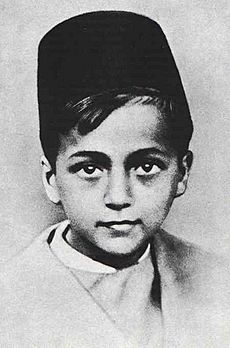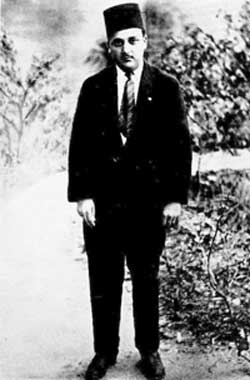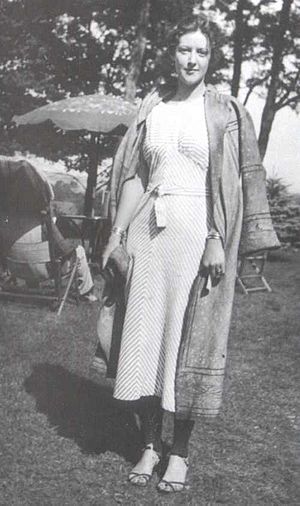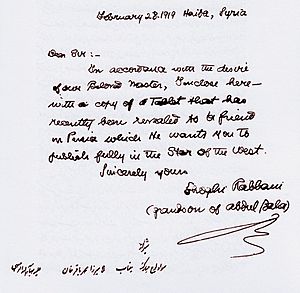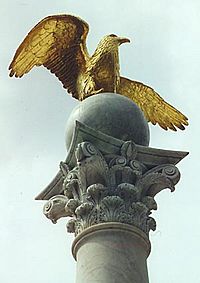Shoghi Effendi facts for kids
Quick facts for kids Shoghi Effendi |
|
|---|---|
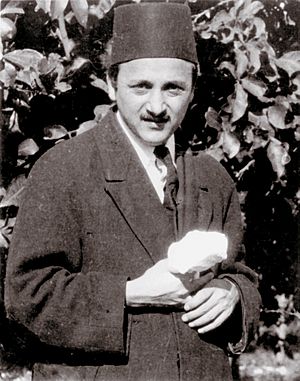
Shoghi Effendi in Haifa, 1921
|
|
| Religion | Baháʼí Faith |
| Personal | |
| Nationality | Persian |
| Born | Shoghí Afnán 1 March 1897 Acre, Ottoman Empire |
| Died | 4 November 1957 (aged 60) London, United Kingdom |
| Resting place | New Southgate Cemetery, London 51°37′26″N 0°08′39″W / 51.6240°N 0.1441°W |
| Spouse | |
| Parents | Mírzá Hádí Shírází (father) Ḍíyáʼíyyih Khánum (mother) |
| Relatives | Baháʼu'lláh (great-grandfather) ʻAbdu'l-Bahá (grandfather) |
| Senior posting | |
| Title | Guardian |
| Successor | None |
| Signature |  |
Shoghi Effendi (born March 1, 1897 – died November 4, 1957) was an important leader of the Baháʼí Faith. He was the grandson of ʻAbdu'l-Bahá, who was the previous leader. Shoghi Effendi became the Guardian of the Baháʼí Faith in 1921 when he was 24 years old. He led the religion until he passed away in 1957.
During his time as Guardian, Shoghi Effendi helped the Baháʼí Faith grow worldwide. He created plans to spread the religion to many new countries. He also translated many important Baháʼí writings into English. After his death, a group called the Hands of the Cause guided the faith. Later, the Universal House of Justice was elected in 1963 to lead the Baháʼí community.
Shoghi Effendi spent his early life in ʻAkká. He later studied in Haifa and Beirut. In 1918, he earned a degree from the American University of Beirut. He then worked as a secretary and translator for his grandfather, ʻAbdu'l-Bahá. In 1920, he went to Balliol College, Oxford in England to study politics and economics. His studies were cut short when ʻAbdu'l-Bahá died, and Shoghi Effendi became the Guardian.
He led the Baháʼí Faith for 36 years. He wrote over 17,500 letters, mostly in Persian and English. These letters guided Baháʼí communities around the world. He helped them grow and deal with challenges. He also worked on building the Baháʼí World Centre in the ʻAkká/Haifa area. He appointed 32 people as Hands of the Cause. These people helped teach the faith and protect it. Under his leadership, the Baháʼí Faith grew from 100,000 members to 400,000. The number of places where Baháʼís lived grew from 1,034 in 1935 to 14,437 in 1963.
He was born Shoghí Rabbání but is known as Shoghi Effendi. "Effendi" means "Sir" and shows respect. Because he was the only person to hold the role of Guardian, Baháʼís often call him The Guardian.
Contents
Early Life and Family Connections
Shoghi Effendi was born in ʻAkká, in the Ottoman Empire, in March 1897. He had important family connections to the founders of the Baháʼí Faith. His father, Mírzá Hádí Shírází, was related to the Báb. His mother, Ḍíyáʼíyyih Khánum, was the eldest daughter of ʻAbdu'l-Bahá. This made ʻAbdu'l-Bahá his grandfather.
His grandfather, ʻAbdu'l-Bahá, played a big role in his early life. ʻAbdu'l-Bahá taught him prayers and encouraged him to chant them loudly. He also insisted that people call the child "Shoghi Effendi" as a sign of respect.
From a young age, Shoghi Effendi saw the difficulties Baháʼís faced. He knew about attacks against ʻAbdu'l-Bahá. He also knew that the Sultan wanted to send ʻAbdu'l-Bahá far away. These experiences shaped his understanding of the Baháʼí Faith.
Education and Studies
Shoghi Effendi first studied at home with other children. Then he went to a French school in Haifa. Later, he attended a Catholic boarding school in Beirut. He was supposed to travel with his grandfather, ʻAbdu'l-Bahá, to the West. However, he became ill and could not go.
He later attended the Syrian Protestant College, now called the American University of Beirut. He earned an arts degree there in 1918. He often felt unhappy at school and loved returning to Haifa to be with ʻAbdu'l-Bahá. During his studies, he worked hard to master English. He already spoke Persian, Turkish, Arabic, and French. Learning English helped him translate ʻAbdu'l-Bahá's letters and serve as his secretary.
During World War I, his college was neutral, so he was safe. After finishing his studies, he returned to Haifa in 1918. He spent almost two years helping ʻAbdu'l-Bahá with his many letters. He felt that this was a time for great service.
After his time in Haifa, he went to Balliol College, Oxford, in England. He studied economics and social sciences there. He also continued to improve his translation skills. Shoghi Effendi enjoyed his time at Oxford. Friends remembered him as a happy and popular student. He met Anthony Eden, who later became a British prime minister. He also visited small Baháʼí communities in the United Kingdom. He developed a love for British culture, reading The Times and enjoying English literature.
Becoming the Guardian
While Shoghi Effendi was studying in England, his grandfather, ʻAbdu'l-Bahá, passed away on November 29, 1921. This news deeply saddened Shoghi Effendi. He quickly returned to Haifa, arriving on December 29.
A few days later, he opened ʻAbdu'l-Bahá's Will and Testament. This document was addressed to Shoghi Effendi. In it, he was named ʻAbdu'l-Bahá's successor and the new head of the Baháʼí Faith. This was a huge responsibility for a 24-year-old.
Personal Life
Shoghi Effendi's personal life was mostly focused on his work as Guardian. He worked very hard, dealing with many letters and tasks. He sometimes took short breaks in Europe, often in the Swiss Alps. He also traveled through Africa in 1929 and 1940.
In public, he was seen as calm and knowledgeable about world events. In private, friends remembered him as warm, friendly, and funny. He slept very little and usually ate only once a day. He was short with dark hair, an olive skin tone, and hazel eyes. He was said to look more like his great-grandfather Baháʼu'lláh than his grandfather ʻAbdu'l-Bahá.
He loved the English language and English literature. He enjoyed reading the King James Bible. He spoke English with a clear, formal accent. He spoke Persian with an Isfahani accent, like his grandmother. He remained an Iranian citizen his whole life and used an Iranian passport. However, he never visited Iran.
Marriage
On March 24, 1937, Shoghi Effendi married Mary Maxwell. She was Canadian and the daughter of May Maxwell, a follower of ʻAbdu'l-Bahá. Shoghi Effendi had met Mary when she was a girl. She later became an active Baháʼí teacher.
In 1936, Shoghi Effendi invited Mary and her mother to visit Haifa. They arrived in January 1937. Mary was 26 years old, tall, and athletic. She had been living in Nazi Germany before coming to Haifa. The couple quietly married in Haifa. The ceremony was simple and private. The Baháʼí world community was surprised when Shoghi Effendi's mother announced the marriage.
Shoghi Effendi and Rúhíyyih Khánum did not have children. Rúhíyyih Khánum became his constant helper. In 1941, she became his main secretary for English letters. Shoghi Effendi once said she was "my helpmate, my shield... and my tireless collaborator."
Key Achievements
Shoghi Effendi's leadership focused on two main goals. He worked to build up the Baháʼí administration. He also worked to spread the religion around the world.
Building the Administration
When Shoghi Effendi became Guardian, the Baháʼí community was small. He spent many years making it stronger and more organized. He helped create National Spiritual Assemblies and thousands of Local Spiritual Assemblies. These groups manage Baháʼí affairs in different areas.
He also helped build several Baháʼí Houses of Worship around the world. These are special places for prayer and worship. Starting in the late 1940s, he developed the Baháʼí World Centre in Haifa. This included building the top part of the Shrine of the Báb. He also built the International Archives and beautiful gardens.
In 1951, he created the International Baháʼí Council. This group was a step towards forming the Universal House of Justice. He also appointed 32 living Hands of the Cause. These were important people whose main job was to teach and protect the Baháʼí Faith.
Global Growth
Under Shoghi Effendi's leadership, the Baháʼí Faith grew a lot. The number of members increased from 100,000 to 400,000. The number of countries and places where Baháʼís lived grew from 35 to 250.
He shared his vision with Baháʼís worldwide through his many letters. He also met with pilgrims who visited Palestine. Starting in 1937, he began a series of plans. These plans aimed to create Baháʼí communities in every country. A big plan called the Ten Year Crusade took place from 1953 to 1963. It had big goals for spreading the faith to almost every country.
Other Contributions
Before World War II, Shoghi Effendi supported the work of Richard St. Barbe Baker. Baker was a forester who wanted to replant trees in Palestine. Shoghi Effendi introduced him to religious leaders. These leaders then supported the effort to reforest the land.
Leadership Style
When Shoghi Effendi first became Guardian, he was only 24 years old. He was shocked by the appointment and sad about his grandfather's death. He sometimes went to the Swiss Alps to find peace.
Even though he was young, Shoghi Effendi had a clear idea for the religion. He was educated at Oxford and dressed in a Western style. This was different from his grandfather, ʻAbdu'l-Bahá. Shoghi Effendi did not travel much to visit Baháʼís. Instead, he communicated through letters and meetings with pilgrims.
As Guardian, he had the power to explain the writings of Baháʼu'lláh and ʻAbdu'l-Bahá. His explanations were important and had to be followed. His leadership style was different from ʻAbdu'l-Bahá's. He signed his letters as "your true brother." He focused on the role of the Guardianship, not on himself. He asked Baháʼís to call him only "Shoghi Effendi." He also asked them not to celebrate his birthday or display his picture.
Translations and Writings
Shoghi Effendi translated many important Baháʼí writings into English. These included works by the Báb, Baháʼu'lláh, and ʻAbdu'l-Bahá. Some of his translations include the Hidden Words (1929) and the Kitáb-i-Íqán (1931). He also translated Gleanings (1935) and Epistle to the Son of the Wolf (1941). He also translated historical books like The Dawn-breakers.
His translations are very important. He was the official interpreter of the Baháʼí writings. So, his translations serve as a guide for all future translations.
Most of his own writings were letters to Baháʼís around the world. He wrote about 17,500 letters, and it is believed there are 34,000 unique works in total. These letters covered many topics, from daily Baháʼí matters to important themes. Some of his longer letters were collected into books like World Order of Baháʼu'lláh and Advent of Divine Justice.
He also wrote about Baháʼí beliefs, history, and laws. Many of his letters have been put into books. These books are important sources of information for Baháʼís. The only actual book he wrote was God Passes By in 1944. This book tells the history of the first 100 years of the Baháʼí Faith.
Challenges and Family Issues
Mírzá Muhammad ʻAlí was ʻAbdu'l-Bahá's half-brother. Baháʼu'lláh had said that Muhammad ʻAli's position was "beneath" ʻAbdu'l-Bahá's. Muhammad ʻAli later tried to take leadership from ʻAbdu'l-Bahá and was asked to leave the community.
When Shoghi Effendi became Guardian, Muhammad ʻAli tried again to claim leadership. He suggested that Baháʼu'lláh's words meant he should be the leader.
Rúhíyyih Khánum, Shoghi Effendi's wife, later shared parts of her diaries. These showed that Shoghi Effendi faced a lot of pain and difficulty from some of his own family members.
Over time, almost all of ʻAbdu'l-Bahá's remaining family members were asked to leave the community. This happened when they did not follow Shoghi Effendi's request to avoid contact with those who caused problems for the faith. Other parts of Baháʼu'lláh's family had already been asked to leave by ʻAbdu'l-Bahá. By the time Shoghi Effendi died, no living descendants of Baháʼu'lláh remained loyal to him.
Passing Away
Shoghi Effendi died unexpectedly in London on November 4, 1957. He was traveling in Britain and caught the Asian Flu. This flu was part of a worldwide sickness that killed many people. He is buried in New Southgate Cemetery in London.
See also
 In Spanish: Shoghi Effendi para niños
In Spanish: Shoghi Effendi para niños
- Baháʼí administration
- Baháʼí World Centre
- Baháʼí divisions
- Baháʼí Terraces
 | James Van Der Zee |
 | Alma Thomas |
 | Ellis Wilson |
 | Margaret Taylor-Burroughs |


